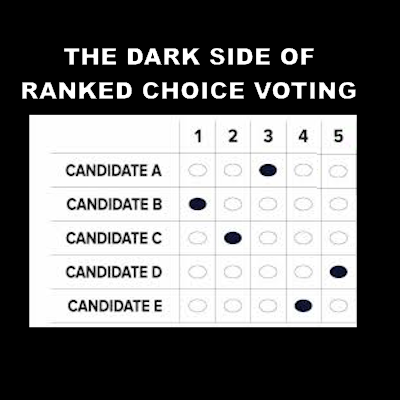The Rankness of Ranked Choice Voting – By Vance Cast


The Rankness of Ranked Choice Voting (RCV): Don’t Be a Fish in the Election Pond
Old timers say, “Stupid fish are caught on shiny new lures and rank-smelling bait.” In the world of politics, Ranked Choice Voting (RCV) appears to be the latest shiny lure promising fairer elections and increased voter satisfaction. However, before taking the plunge, it’s essential to examine the built-in flaws that can allow for voter manipulation and unethical schemes to taint the process. Proponents may tout the merits of RCV, but let’s dive deeper and uncover the five ways in which this system can be manipulated to undermine its supposed fairness. Buckle up, fellow voters, and don’t be a fish caught in the murky depths of manipulated democracy.
Argument 1: “Ranked Choice Voting ensures majority support.”
Fallacy: Proponents argue that RCV guarantees majority support by allowing voters to rank their preferences. However, this overlooks the fact that not all voters fully understand the intricacies of the system. Moreover, it assumes that every voter’s preferences align perfectly with their ranked choices, which is far from reality. RCV opens the door for strategic manipulation, where voters may strategically rank candidates to elevate or eliminate certain contenders, distorting the true representation of the majority.
Argument 2: “Ranked Choice Voting promotes positive campaigning.”
Fallacy: Advocates claim that RCV incentivizes candidates to engage in more positive and issue-based campaigns. However, human nature often prevails over idealistic notions. In reality, RCV can intensify negative campaigning as candidates strive to undermine their opponents in the eyes of voters, all while maintaining a superficially positive facade. The ability to transfer rankings and strategically target opponents can transform the election arena into a shark tank of political mudslinging.
Argument 3: “Ranked Choice Voting eliminates wasted votes.”
Fallacy: The notion that RCV eliminates wasted votes may sound appealing, but the devil lies in the details. The transfer of rankings in RCV can result in the manipulation of outcomes. By tactically managing their supporters’ rankings and exploiting the intricacies of the system, interest groups and political machines can secure advantageous results. This undermines the principle of genuine voter choice and creates a breeding ground for backroom deals and strategic alliances that betray the true intent of democracy.
Five Ways RCV Can Be Manipulated:
Strategic Ranking: Interest groups and parties can manipulate rankings to ensure favorable outcomes by strategically placing candidates in certain positions.
Misinformation Campaigns: Spreading misinformation about candidates’ policies or qualifications can influence voters’ rankings, skewing the results.
Tactical Candidate Entry: Parties can strategically field multiple candidates to split voter support and exploit the transferable rankings.
Rank Dropping: Encouraging supporters to rank only certain candidates while deliberately excluding others can manipulate the transfer of preferences.
Voting Blocs: Coordinating efforts among supporters to rank specific candidates in a specific order can consolidate power and influence the final outcome.
In the words of political sage Mark Twain, “If you don’t read the newspaper, you’re uninformed. If you read the newspaper, you’re misinformed.” Similarly, when it comes to Ranked Choice Voting, staying informed and vigilant is crucial. Don’t be a gullible fish, enticed by the shiny promises of RCV. Instead, exercise your democratic duty to question, scrutinize, and demand transparency. Only then can we hope to navigate the treacherous waters of politics and preserve the true essence of democracy.
The Truth-Telling Power of Rating over Ranking:
While proponents of Ranked Choice Voting (RCV) argue that ranking candidates provides a fairer representation of voter preferences, there is a crucial distinction between ranking and rating that must be addressed. Ranking requires voters to order their preferences, often with limited knowledge or conviction about the subsequent choices they are forced to make. This aspect introduces a potential flaw in the system as subsequent choices may not truly align with voters’ true preferences or reflect their level of support.
In contrast, rating allows voters to express their true sentiments by assigning a score or rating to each candidate independently. This rating system offers a more nuanced and accurate representation of individual preferences. It allows voters to differentiate between candidates and express degrees of favorability or disfavorability without being bound by the constraints of a ranking order.
The flaw in ranking becomes evident when voters are compelled to assign rankings to candidates they have little to no affinity for. It may force voters to select candidates as second or third choices who are far from their first choice in terms of alignment with their values and beliefs. This aspect of ranking can distort the true will of the voters and potentially lead to outcomes that do not genuinely reflect their preferences.
Rating, on the other hand, allows voters to assign scores based on their honest evaluation of each candidate’s qualities and qualifications. It offers a more flexible and truthful means of expressing support or opposition. By giving voters the freedom to assess candidates independently, rating provides a clearer picture of the electorate’s collective sentiment.
In an era where transparency and authenticity are increasingly valued, the use of rating systems in elections can serve as a powerful tool for truth-telling. It enables voters to express their genuine preferences without the constraints of forced rankings that may misrepresent their true sentiments. By embracing rating over ranking, we can foster a more accurate and democratic representation of voter choices, promoting a system that better serves the ideals of fairness and authenticity.
Conclusion
Remember, dear readers, the choice is yours. Will you be a fish caught on the lure of RCV’s supposed fairness, or will you swim against the current of manipulation and safeguard the integrity of our elections? The decision lies in your hands.
Author Notes

This article is written by Dr. C. Vance Cast, and expresses his opinions on the current state of political wrangling, dishonesty, and gaslighting.
Dr. Vance is a native of Tucson, Arizona. He is an research methodologist & analyst, author, educator, radio host, and business man, with many personal and community interest.
As a “pollical outsider”, and after noticing a vast amount of ignorance in the arena, including his own, Vance’s mission is to educate and lead citizens in the constitution and it’s application. And becoming and Ambassador to US Congress, representing his home state of Arizona.
